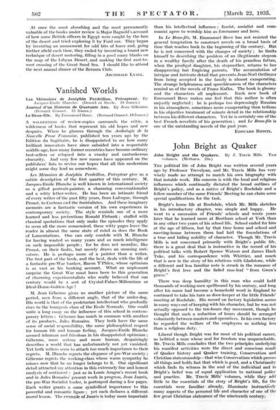Vanished Worlds
Les Memoires de Josephin Perdrillon, Precepteur. By
(Bernard Grasset. 15 francs.)
Le Beau-flls. By Emmanuel Bove. (Bernard Grasset. 18 francs.) A WILDERNESS of review-copies surrounds the critic, a wilderness of books that represent his old hopes and new despairs. When he glances through the Anthologic de la Nouvelle Prose Francaise, published ten years ago by the Edition du Sagittaire, he is disappointed to see how many brilliant innovators have since subsided into a respectable middle-age, how many former eccentrics have become ordinary best-sellers or relapsed into a cranky and cantankerous obscurity. And very few new names have appeared on the publishers' lists to revive our hopes that all this modernism might some day lead us somewhere.
Les Memoires de Josiphin Perdrillon, Precepleur give us a satiric description of the first quarter of this century. M. Jacques-Emile Blanche is well known in international society as a gifted portrait-painter, a charming conversationalist and a witty letter-writer. He has been an intimate friend of every writer of the past fifty years, from Laforgue, through Proust, to Cocteau and the Surrealistes. And these imaginary memoirs are a fantastic version of his own experiences in contemporary society. The style reminds one of a more learned and less pretentious Ronald Firbank ; stuffed with classical quotations that only make the episodes they apply to seem all the more nonsensical, these witty pages leave the reader in almost the same state of mind as does the Book of Lamentations. One can only condole with M. Blanche for having wasted so many years and so much intelligence on such impossible people ; for he does not moralize, like Proust, on their faults, but merely draws an amusing cari- cature. He is perhaps more of a painter than a writer. The first part of the book, and the best, deals with the life of a fantastic pre-War banker, Baron T'Phlex, whose optimism is as vast as his banking account. What an unpleasant surprise the Great War must have been to this generation of charming experimentalists who really believed that our century would be a sort of Crystal-Palace-Millennium or Ideal-Home-Golden-Age
M. Jean Gehenno gives us another picture of the same period, seen from a different angle, that of the under-dog. His world is that of the proletarian intellectual who gradually rises to the bourgeois class of the Ecole Normale. One could write a long essay on the influence of this school in contem- porary letters ; Gehenno has much in common with another of its products, Jules Romains. They both have the same sense of social responsibility, the same philosophical respect for human life and human feeling. Jacques-Emile Blanche seemed inhuman and frivolous in his disappointed optimism ; Gehenno, more serious and more human, despairingly describes a world that has unfortunately not yet vanished. Yet both writers seem to attach too much importance to their regrets. M. Blanche regrets the elegance of pre-War society ; Gehenno regrets the working-class whose warm sympathy he misses now that he no longer belongs to it. One significant detail attracted my attention in this extremely fine and honest analysis of sentiment : just as in Louis Aragon's recent book and in Jules Romains' present work in progress, Jean James, the pre-War Socialist leader, is portrayed during a few pages. Each writer grants a. same symbolical importance to this powerful and romantic figure ; yet each deduces a different moral lesson. The example of Jaur6s is today more important than his intellectual influence ; fascist, soeialist and com- munist agree to worship him as forerunner and hero.
In Le Beau-fils, M. Emmanuel Bove has not resisted the general temptation to construct novels on a broad basis of time that reaches back to the beginning of the century. But he is not concerned with the changes of society; he limits himself to describing the problem of an illegitimate stepson in a wealthy family after the death of his penniless father, when the prodigal daughter, his stepmother, returns to her disapproving but forgiving parents. The accumulation of intrigue and intricate detail that prevents Jean-Noel Oetlinger from being accepted in the family is almost exasperating. The strange helplessness and speechlessness of the characters remind us of the novels of Franz Kafka. The book is gloomy and the characters all unpleasant. Each new book of Emmanuel Bove makes one feel that this author is often unjustly neglected ; he is perhaps too depressingly Russian in his atmosphere, sometimes more exasperating than tedious in his objective treatment of minute detail in the relationship between his different characters. Yet he is certainly one of the best French novelists of his generation ; and Le Beau-file is one of the outstanding novels of the past year.
EDOUARD RODITL




























































 Previous page
Previous page